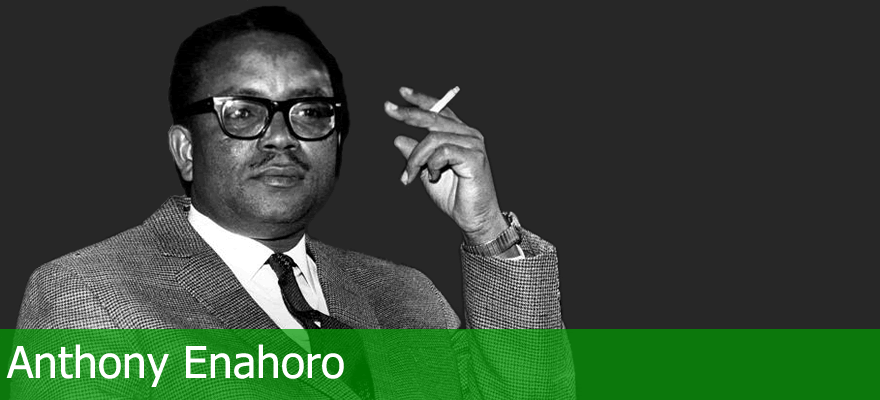Chief Anthony Eromosele Enahoro was a Nigerian nationalist, journalist, pro-democracy activist and politician. He is considered one of the heroes of Nigeria’s independence movement. He came into the limelight in 1944 when he was made editor of the Southern Nigerian Defender at the age of twenty one, becoming the youngest newspaper editor in the history of Nigeria.
Early Life
Anthony Enahoro was born in Uromi in present-day Edo State on July 22, 1923 to Anastasius Okotako Enahoro and Fidelia Inibokun (née Ogbidi Okojie). He was educated at Government School, Uromi; Government School, Owo, (in Ondo State); and King’s College, Lagos. While a student at King’s College in the 1940s, he became a student leader and led several anti-colonial protests. He married Helen Imayuse Ediae – daughter of Chief J. Ediae Idahosa, the Aiwerioba of Benin – on January 10, 1954. They had five children.
Career in Journalism
In 1944 at the age of twenty-one, Anthony Enahoro met Nnamdi Azikiwe who sent him from Lagos to Ibadan to edit his newspaper, the Southern Nigerian Defender, making him Nigeria’s youngest ever newspaper editor. He was also editor of the Daily Comet from 1945 to 1949; assistant editor of the West African Pilot (based in Lagos and previously edited by Azikiwe) from 1950 to 1952; and editor-in-chief of the Morning Star (based in Sapele, Delta State) from 1950 to 1953.
As an editor, Enahoro often came into conflict with the British colonial government. In 1946, he published an exposé of British colonial misconduct in the Daily Comet which earned him nine months of imprisonment on sedition charges. He served a twelve-month sentence in 1947 for a stirring speech denouncing police violence and discrimination against Nigerian troops serving in the British army. His final incarceration by the colonial administration was in 1949 when he defied the administrations order’s and chaired a lecture for Azikiwe’s Zikist Movement.
Political Career
Anthony Enahoro joined the Action Group (AG), a newly established political party led by Obafemi Awolowo, in 1951 and was elected a member of the Federal House of Assembly in the same year. It was while a member of the House on March 31, 1953 that Enahoro moved the historic motion in favour of granting independence to Nigeria. Although it was rejected by an overwhelming majority of the northern leaders in the House, it inspired other nationalists to intensify their struggle which eventually culminated in the achievement of independence on October 1, 1960.
Enahoro was also elected a member of the Western House of Assembly in 1952 and in 1954 Obafemi Awolowo, then the Western Premier, appointed him Minister of Home Affairs. In 1955, he was conferred with the title of Adolor Uromi in recognition of his contributions to the independence movement (adolor is an Edo word which refers to a person who brings progress and development). He became the Deputy National President of the Action Group in 1958 and led a delegation of the party to the inaugural All African People’s Congress in Accra, Ghana.
A crisis erupted in the Action Group in 1962 when the leadership of the party was accused of plotting a coup against the federal government and threatened with detention. In September, Enahoro fled Nigeria for London, travelling via Accra. The Nigerian government mounted pressure on the Labour Party-controlled British Parliament to extradite Enahoro by invoking the 1881 Fugitive Offenders Act. The London authorities detained him in Brixton Prison. His case was intensely debated in parliament until Harold Macmillan, the British Prime Minister, bowed to the majority’s argument. Enahoro’s asylum request was rejected and he was extradited in March 1963. The Nigerian government sentenced him to fifteen years’ imprisonment on charges of felony and treason in September 1963. The sentence was later reduced to ten years on appeal.
He was released in 1966 by the military government of General Yakubu Gowon and in 1967, Gowon appointed him Commissioner of Information and Labour, a position he was to serve in from the period of the Nigerian Civil War until 1974. He served as Federal Commissioner for Special Duties under General Murtala Muhammed in 1975 until the latter’s assassination.
Enahoro was a member of the National Party of Nigeria (NPN) from 1978 to 1983 and was the chairman of the party’s Bendel State (present day Delta and Edo states) branch from 1978 to 1980.
Later Activism
After the military coup that ousted the government of Alhaji Shehu Shagari, Enahoro was among the first to criticise the activities of the military. He convened the Movement for National Reformation (MNR) in 1992 when it became evident the military were not willing to relinquish power to a civilian government. He was a co-chairman and the Steering Committee Chairman of the National Democratic Coalition of Nigeria (NADECO) from 1993 to 1998. He went into exile in 1996 to escape the military’s assassination attempts, eventually returning from the US in 2000.
In 2005, Enahoro co-founded another pro-democracy movement, the Pro-National Conference Organisation (PRONACO). He was chairman of the movement from 2005 to 2007.
Awards
In 1973, Enahoro was awarded an honorary doctorate in political science from the University of Benin. The federal government conferred on him the honour of Commander, Order of the Federal Republic (CFR) in 1982.
Death
Enahoro died on December 15, 2010 after a protracted battle with diabetes at his residence in Benin.
Sources
The above was compiled using the following sources:
Picture Sources: The UK Times and The Guardian UK


